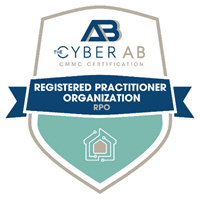CMMC Title 48 CFR Rule for the Defense Industrial Base
As a small business working with the Department of Defense (DoD), it is important to follow cybersecurity rules. This helps secure contracts. One important rule to know is the 48 CFR rule. This rule is linked to the Cybersecurity Maturity Model Certification (CMMC) 2.0 program.
This rule will soon be important for how contractors show their cybersecurity readiness. It will help them keep competing for defense contracts. Here’s a breakdown of what the 48 CFR rule means for small businesses like yours and how to stay on track.
What is 48 CFR?
48 CFR, or “Title 48 of the Code of Federal Regulations,” is a part of the Federal Acquisition Regulation (FAR) system. FAR sets the rules for federal procurement. It explains how contracts are awarded and how contractors must follow different requirements. Specifically, 48 CFR governs acquisition standards for defense-related activities and incorporates cybersecurity requirements under the CMMC framework.
The 48 CFR rule ensures that defense contractors follow specific cybersecurity practices, such as those outlined in NIST 800-171. This is important for small businesses. In the future, you will need to show compliance with CMMC levels. This is necessary to qualify for government contracts.
How Does 48 CFR Relate to CMMC?
CMMC 2.0 is a cybersecurity certification program designed to protect sensitive information and improve cybersecurity practices across the defense supply chain. The program has two main regulations: 32 CFR, which outlines the requirements, and 48 CFR, which enforces those requirements through the federal procurement system.
Starting in mid-2025, the 48 CFR rule will require defense contractors to be CMMC certified to be awarded new contracts. At first, businesses must meet CMMC Level 1 for basic contracts. For more advanced work, especially with Controlled Unclassified Information (CUI), they will need a higher certification, Level 2.
The CMMC 2.0 program has three key features:
A Tiered Model:
The CMMC program outlines the process for protecting Controlled Unclassified Information (CUI) shared with the Defense Industrial Base (DIB). It requires companies handling national security information to meet cybersecurity standards at the appropriate level, based on the type and sensitivity of the information. To view the 3 Tiers/Levels of CMMC, visit the CMMC standard page.
If your contract says you must comply with CMMC, or you handle CUI now or in the future, the CORE Vault CUI Enclave could be a good solution for your business. To learn more, visit the CORE Vault page.
Assessment Requirement:
CMMC assessments allow the DoD to verify that the defined cybersecurity requirements have been met.
Implementation through Contracts:
Once CMMC is fully in place, contractors must meet the required CMMC level to win a contract. The Title 48 CFR Rule is set to go into effect in contracts mid-2025.

Why Is the 48 CFR Rule Important for Small Businesses?
The 48 CFR rule directly affects how small businesses can engage in federal contracting. Here’s why:
- You must show that your business meets the required CMMC levels. This is necessary before you can bid on or keep contracts. Failure to comply could result in losing out on lucrative opportunities.
- Flow-Down Requirements: If you work as a subcontractor, your prime contractor will expect you to comply with the CMMC requirements as well. This adds more responsibility. You need to make sure your cybersecurity practices meet the required standards.
- The government will introduce the CMMC requirements in phases over three years. Full enforcement is expected by 2028. This gives small businesses time to prepare but also means that you must act soon to meet compliance deadlines.
Key Implications of the 48 CFR Rule for Small Businesses
Here are the main takeaways for small businesses in the defense industry:
- Certification Tied to Contracts: The 48 CFR rule ties CMMC certification to the ability to win government contracts. As soon as the rule takes effect, you’ll need to prove your compliance at the appropriate CMMC level.
- Subcontractor Accountability: If you’re a subcontractor, the prime contractor will need to ensure you comply with the cybersecurity standards. This could mean additional pressure to meet certification requirements, especially if you’re part of a larger supply chain.
- Timeline for Compliance: The phased rollout means that by 2025, all contracts related to national defense will require at least CMMC Level 1 compliance. As the rule progresses, more contracts will require higher levels of certification.
Steps Small Businesses Can Take to Prepare
The timeline for compliance is short, and small businesses need to act to ensure they are ready. Here are steps you can take:
- Understand the Requirements: Start by reviewing the CMMC 2.0 checklist to understand the cybersecurity practices you need to implement.
- Perform a Gap Analysis/Initial Assessment: Compare your current cybersecurity measures with the CMMC standards to identify any areas where you fall short. This will help you create a plan to close those gaps.
- Document Your Cybersecurity Practices: Develop a System Security Plan (SSP) that outlines how you protect sensitive data and manage cybersecurity risks. This is a key document for your CMMC certification.
- Seek Expert Guidance: Engage with compliance experts who can help you navigate the complexities of the 48 CFR rule and CMMC. They can provide tailored strategies and help you prepare for assessments.
- Train Your Team: Ensure your employees understand the importance of cybersecurity and are trained to follow best practices in protecting sensitive information.
- Plan for the Future: The CMMC requirements will continue to evolve. Stay informed about any updates to the 48 CFR rule and adapt your business practices accordingly.
A CMMC Example
Let’s consider a small business, a veteran-owned company that develops software for defense applications. The company is struggling to meet the cybersecurity requirements under the 48 CFR rule.
With limited internal resources, they turn to a compliance partner like Core Business Solutions to guide them through the process. The expert helps them do a readiness assessment. They also develop their SSP and finish the steps needed for CMMC Level 2 certification. With this support, the business can meet the certification deadline and secure new contracts.

Conclusion
The 48 CFR rule is an important regulation. Small businesses in the defense sector need to understand it and follow it. It’s tied to the CMMC 2.0 certification process, which is critical for securing government contracts.
Act now to check your cybersecurity practices. Get expert help and prepare for certification. This will keep your business competitive and safe in the changing defense industry. The timeline is short. However, with the right steps, your business can meet the requirements. This will help it thrive in government contracting.
Core Business Solutions, established in 2000, is a Registered Practitioner Organization through the Cyber AB and has been providing consulting and technical solutions for NIST/CMMC for over 5 years. Rick Krick is the Director of Security Solutions for Core Business Solutions and directs our Cybersecurity Services solutions including CMMC. Rick has over 25 years of experience in Management System implementations, software development, IT services, and certifications.




